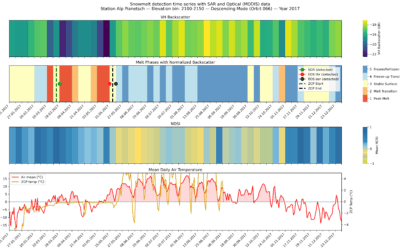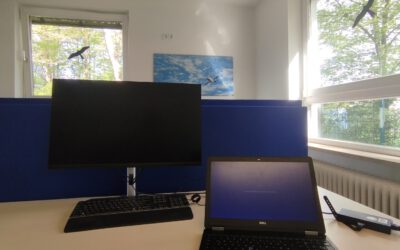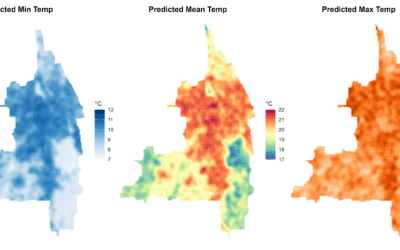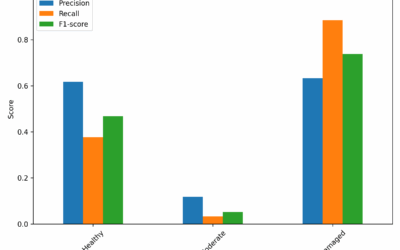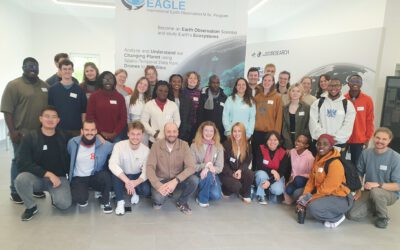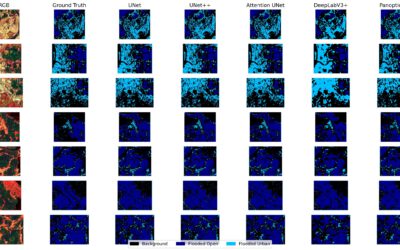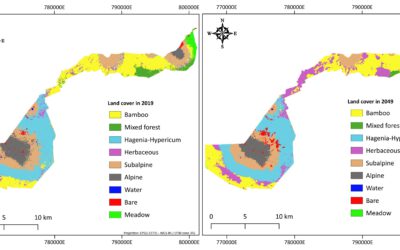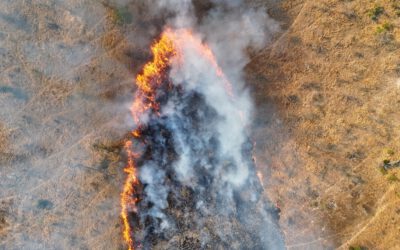Aim:
Within this course different methods to analyse point pattern statistically and conduct a spatial prediction are covered. Students will learn how to design such analysis, how to avoid caveats, troubleshoot errors and interpret the results.
Content
Different statistical methods will be applied for analysing spatial point patterns, such as vegetation samples or biodiversity related information. These results will be statistically predicted using methods such as GLM, GAM, Random Forest or MaxEnt. Implications of spatial point patterns as well as chosen environmental parameters will be discussed. All methods will be practically applied during the course using the programming language R. The needed pre-requisites are covered in the course “Applied Programming for Remote Sensing and GIS“.
Coding
Software
Techniques
Content
General Course News and Updates
EAGLE MSc Defense: “Detecting Snow Phases and Runoff Using Sentinel-1 SAR and Multispectral–Optical Data”
On December 09, 2025, Daria Ushakova will present her Master Thesis on " Detecting Snow Phases and Runoff Using Sentinel-1 SAR and Multispectral–Optical Data " at 13:00 in seminar room 3, John-Skilton-Str. 4a. From the abstract: Snow is a crucial component of the...
EAGLE Internship Presentation “Detecting Wildfires in Brandenburg, Germany”
On November 18, 2025, Angie Torres will present her internship at " Detecting Wildfires in Brandenburg, Germany" at 12:00 in seminar room 3, John-Skilton-Str. 4a. From the abstract: Wildfires have become an increasing concern in Germany, particularly in the region of...
EAGLE MSc Defense “Modeling Urban Heat Exposure and Vulnerability Integrating Citizen Science and VHR Remote Sensing”
On October 22, 2025, Ariana Sofía Argüello Cordero will present her Master Thesis on " Modeling Urban Heat Exposure and Vulnerability Integrating Citizen Science and VHR Remote Sensing" at 10:15 at the EORC Meeting Room (1st floor), John-Skilton-Str. 4a From the...
EAGLE Internship Presentation “Gobabeb Namib Research Institute”
On October 21, 2025, Farimah Abdolzadeh will present her internship at " Gobabeb Namib Research Institute " at 12:30 in seminar room 3, John-Skilton-Str. 4a. Farimah has just completed her internship at the Gobabeb Namib Research Institute, located in the heart of...
EAGLE Innolab Presentation “Modeling Tree-Level Beech Leaf Loss in Bavaria Under Climate Stress with Multimodal Deep Learning Architectures”
On October 21, 2025, Henning Riecken will present his Innolab results on " Modeling Tree-Level Beech Leaf Loss in Bavaria Under Climate Stress with Multimodal Deep Learning Architectures " at 12:00 in seminar room 3, John-Skilton-Str. 4a. From the abstract: European...
Welcome to our new EAGLEs – Embarking on an Earth Observation Journey
As the autumn term begins and the leaves turn golden across Europe, we are pleased to welcome a fresh cohort of EAGLEs—our new MSc students in Earth Observation and Geoinformatics. This year’s group brings together curious minds from diverse academic and cultural...
New EAGLEs take off into the Winter Term 2025/26
As in previous years, the next generation of EAGLE Master's students from around the world gathered at the Earth Observation Research Center (EORC) on the first day of the winter term to begin their studies at the University of Würzburg. Prof. Dr. Tobias Ullmann...
EAGLE MSc Defense “Coastal Urban Flood Detection and Analysis Using SAR and CNN-Based Methods: A Case Study for Central Vietnam”
On September 23, 2025, Elly Schmid will present her Master Thesis on " Urban Flood Detection and Analysis Using SAR and CNN-Based Methods: A Case Study for Central Vietnam" at 12:00 in seminar room 3, John-Skilton-Str. 4a. From the abstract: With over half of the...
EAGLE MSc Defense “Utilizing deep learning and Earth Observation data to predict land cover changes in Volcanoes National Park, Rwanda”
On September 16, 2025, Jean de Dieu Tuyizere will present his Master Thesis on "Utilizing deep learning and Earth Observation data to predict land cover changes in Volcanoes National Park, Rwanda" at 12:00 in seminar room 3, John-Skilton-Str. 4a From the abstract:...
Mapping Fire from the Sky – Anna Bischof’s MSc Thesis on Savanna Fire Patterns
Wildfires are an essential ecological process in African savannas, shaping landscapes, influencing biodiversity, and playing a key role in nutrient cycling. Understanding their dynamics is crucial for both science and management – and this is where EAGLE MSc student...

